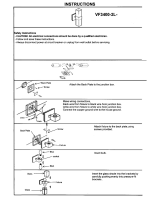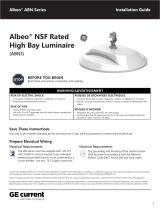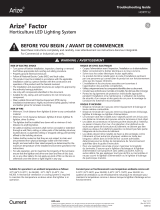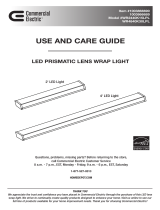Page is loading ...

GE
Lighting Solutions
Installation Guide
imagination at work
Linear Lighting
(ALC4-series)
Features
• 5 year warranty
• Damp location rated
Albeo
TM
LED Luminaire
Prepare Electrical Wiring
Electrical Requirements
• The LED driver must be supplied with 120-480 VAC, 50/60 Hz per product label and connected to an individual
properly grounded branch circuit, protected by a 15 or 20 ampere circuit breaker.
Grounding Instructions
• The grounding and bonding of the overall system shall be done in accordance with National Electric Code
(NEC) Article 600 and local codes.
BEFORE YOU BEGIN
Read these instructions completely and carefully.
WARNING/AVERTISSEMENT
RISK OF ELECTRIC SHOCK
• Turn power off before inspection, installation or removal.
• Properly ground electrical enclosure.
RISK OF FIRE
• Follow all NEC and local codes.
• Use only UL or IEC approved wire for input/output connections.
Minimum size 18 AWG.
RISQUES DE DÉCHARGES ÉLECTRIQUES
• Coupez l’alimentation avant d’’inspecter, installer ou déplacer le luminaire.
• Assurez-vous de correctement mettre à la terre le boîtier d’alimentation électrique.
RISQUES D’INCENDIE
• Respectez tous les codes NEC et codes locaux.
• N’utilisez que des ls approuvés par UL ou IEC pour les entrées/sorties de
connexion. Taille minimum 18 AWG.
Save These Instructions
Use only in the manner intended by the manufacturer. If you have any questions, contact the manufacturer.
This device complies with part 15 of the FCC Rules. Operation is subject to the following two conditions: (1) This device may not cause harmful interference, and
(2) this device must accept any interference received, including interference that may cause undesired operation. CAN ICES-3 (A)/NMB-3(A)
This equipment has been tested and found to comply with the limits for a Class A digital device, pursuant to part 15 of the FCC Rules. These limits are designed
to provide reasonable protection against harmful interference when the equipment is operated in a commercial environment. This equipment generates, uses,
and can radiate radio frequency energy and, if not installed and used in accordance with the instruction manual, may cause harmful interference to radio
communications. Operation of this equipment in a residential area is likely to cause harmful interference in which case the user will be required to correct the
interference at his own expense.

Choose a mounting method: chain, cable, rod or surface mount.
Chain Cable Rod Surface
Hang up to two chains, cables or rods from a structural member of the
ceiling to support each xture. Fixture must be supported independently
of an outlet box. Install mounting brackets for each xture.
1
Unit Installation
Please follow all UL, NEC and minimum load rating guidelines
when selecting and installing a chain, cable or rod.
3
2
4
1
4
Mounting bracket (with #6-3/8” Phillips
head screws) and xture shown.
Position mounting bracket in
desired location.
2
5
Fit one side of the bracket into an
extrusion slot on the xture.
Fully tighten screws to lock in
place and strengthen the bracket.
3
6
Squeeze the mounting bracket and
press down until it snaps into place.
Fixture is now ready to install with
chain, cable or rod. If installing a
Continuous Run or Control Module,
please review additional instructions
later in this publication.
Mounting Bracket Installation
ALC4 Fixture Weight
120-277V 347/480V
4 ft. xture 8.5 lbs. 11.5 lbs.
8 ft. xture 17 lbs. 20 lbs.
The mounting bracket can be installed at any location along the length of the xture. Screws must be fully tightened to lock in place
and strengthen the bracket. Each mounting bracket can connect to a chain, cable or rod.
Carefully unpack unit and properly inspect for defects before installing. Wear work gloves to prevent dirt and oil from being
transferred to the luminaire.

Option B: Attach directly to junction box
Surface Mount Installation
Option A: Attach using mounting holes
1
1
3 4
2
2
Loosen screws on side of xture and unhinge LED lightbar
from xture.
Loosen screws on side of xture and unhinge LED lightbar
from xture.
Run power through one of the 0.875” holes in top
of xture and into a junction box. Connect AC wires
from junction box to xture wires (see Step 4 under
Electrical Connections for details).
Reattach lightbar to xture and tighten screws.
Using 3/8” holes on both ends, mount the xture to
ceiling using appropriate hardware (not supplied).
Attach plate to top of xture and tighten with two nuts
on interior of xture. Run wiring out of 0.875” hole.
Ceiling
Fixture wires
Junction box
Junction box
AC line
Open lightbar
Open lightbar
Use mounting holes on both ends
Loosen screws
Loosen screws
Top of xture

3 4
Option: power input from side – Remove knockout in
endcap and A) Install 1/2” conduit, or B) install AC power
cord with strain relief. Plug unused hole on top with
appropriate tting.
120-277V: Connect the green (ground), black (line)
and white (neutral) wires of the AC line to the similarly
colored wires of the xture’s power supply using UL
listed wire connectors. Re-attach endcap.
347-480V: Connect the green (ground), red (line) and
black (neutral) wires of the AC line to the similarly
colored wires of the xture’s power supply using UL
listed wire connectors. Re-attach endcap.
1 2
Loosen screws to remove endcap. Option: power input from top – Remove knockout in top
and A) install 1/2” conduit, or B) install AC power cord
with strain relief.
A) Conduit B) Power cord
Electrical Connections
Note: Please see additional wiring instructions if installing multiple xtures in a Continuous Run or an inline Control Module.
A) Conduit B) Power cord
3 4
Close xture and tighten screws. Connect AC wires from
junction box to xture wires (see Step 4 under Electrical
Connections for details).
Mount xture to junction box.
Junction box
in ceiling

When ordered as an option, continuous run xtures use quick-connectors and keyhole fasteners to properly wire & align the joining xtures.
5 6
7
Shift xtures until keyhole studs lock-in place and xtures
are horizontally aligned
Install two #8-32 screws with nuts (provided) to fasten the
end plates of the joined xtures together
Continue to add xtures as needed to complete the
continuous run.
Note: If there are unused quick-connectors at the end
of a run, cut off the connectors and cap the ends with
wire connectors to terminate the wires. Replace open
end plate with a solid end plate.
Note: The current though the continuous xture run cannot
exceed 20A. See maximum xture run length listed below.
Output
Voltage
Total Run Length (ft.)
T H V
120V 288 192 120
277V 664 440 284
347V 677 495 342
480V 936 685 474
3 4
Push the quick-connect assembly and excess wiring
into the open end of one xture end plate so only a
small length of wire remains between joining xtures.
Align keyhole slots with corresponding keyhole studs and
push xtures together.
Continuous Run Installation
1 2
Completely hang the rst xture in the run. One end
should be closed while the other end has quick-connect
wiring. Using two people, hang the next xture in the run,
making sure to properly align quick-connectors.
Make all wiring connections between xtures using the
provided quick-connectors.
Closed end
First xture in run
Open end

Control Module Wiring Scheme
Each 14” wireless control / occupancy sensor module will power up to 48 ft. of xtures (maximum 24 ft. per side). Note: The xtures
between control sections must not be connected to each other. Power drops must be connected to the control modules.
Wireless control /occupancy sensor module The control module is attached the same as the continuous
run xtures.
NOTE: drawing not to scale
Power drop
Control section 1 Control section 2
Power drop
Etc.
Start of run
DO NOT connect the two xtures
at the end of each control section.
The xtures will not function
properly if they are connected to
multiple control modules.
Wireless control/occupancy sensor module 8 ft. xture
Troubleshooting
Symptom Solution
Luminaire will not turn on. • Check that the color of the supply side wires match the color of the wires they are connected to.
• Check that all wire connectors are properly connected.
• Verify that your input voltage is within specs.
• If you are using any additional controls IE wireless controls // motion sensors, please also verify that
those are working properly and that the unit is setup to interface with the controllers.
Mounting bracket slides
from side to side.
• Check that the mounting bracket is properly tightened using the adjustment screws provided.
ALB003-091114
GE Lighting • 1-888-MY-GE-LED (1-888-69-43-533) • www.gelighting.com
GE Lighting Solutions, LLC is a subsidiary of the General Electric Company. The GE brand, logo, and Albeo are trademarks of the General Electric Company.
© 2014 GE Lighting Solutions, LLC. Information provided is subject to change without notice. All values are design or typical values when measured under laboratory conditions.
Control Module Installation and Wiring
The 14” wireless control /occupancy sensor module can be installed inline with any xture conguration. The contractor must drop
power down to this module and connect any desired adjacent xtures to the module. Note: The occupancy sensor shown in these
images may differ from the actual unit provided.
/




